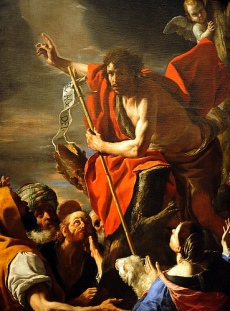A sermon, based on Luke 3.7-18, preached with the people of Epiphany Episcopal Church, Laurens, SC, on the 3rd Sunday of Advent, December 16, 2018
+
John is on a mission. He’s in a holy hurry. Summoned by God, he has emerged from the wilderness to herald the advent, the coming of God’s Messiah; the one who will usher in the kingdom of God. In preparation, John summons the people to a baptism of repentance; an outward washing in water symbolizing inward cleansing.
Repentance, from the Greek, metanoia, literally, “a change of mind.” To repent is to turn away from following our human way and will and to return to God’s way and will.
The people, responding to John’s call, come to be baptized. Yet he, again, in a holy hurry, without a scintilla of gentility, says, “You brood of vipers! Who warned you to flee from the wrath to come? Bear fruits worthy of repentance.”

How’s that for a sermon introduction?
This morning, in the spirit of John, in a holy hurry, cutting to the proverbial chase, I outline concisely his message and contemporize it for our time. And, fear not, I do not consider us and, thus, won’t call us a “brood of vipers”!
There are three points.
Point number one. John called “vipers” those who claimed high standing before God and, therefore, were exempt from divine judgment because of their religious heritage as the progeny of Abraham. Not true, declares John. Ancestry alone without faithfulness means nothing. In this, John boldly challenged the accepted understanding of sacred teaching going back generation upon generation about the everlasting covenant God had made with Abraham and his descendants.(1)
So, in our time, to broaden and apply John’s message, there is nothing from a worldly or human point of view that we can claim as signs of our righteousness in God’s sight.
Not our proud familial roots.
Not our valued cultural, ethnic, and racial identities.
Not our academic degrees.
Not our public accomplishments.
Not our private virtues.
Not the respect of our peers.
Not our economic standing.
Not even our submission to Christian baptism, our years of life in the church, and our devotion to religious practices, including our reception of Holy Communion.
Nothing! For if we dare claim one, any, or all of these things as signs of our righteousness before God, then we have fallen prey to the sin of self-righteousness.
Point number two. What matters, John declares, is “bear(ing) fruits worthy of repentance.”
Later, Jesus the Messiah, during his ministry, taking up John’s theme, would teach: “No good tree bears bad fruit…The good person out of the good treasure of the heart produces good”(2) and, when explaining to his disciples the Parable of the Sower, “As for (the seed that fell on) good soil, these are the ones who, when they hear the word, hold it fast in an honest and good heart, and bear fruit.”(3)
What is this fruit? In a word, John says ethical behavior.
To all who possess plenty share with those who suffer scarcity.
To tax collectors, do your job honorably, don’t increase the people’s tax bills and skim off the top for yourselves.
To soldiers, keep the peace fairly, don’t abuse your authority, terrorizing the people with your weapons, threatening the people with false arrest so to extract a bribe.
So, in our time, nothing has changed about serving those with greater need. Such always has been, always is, and always will be a cardinal ethical virtue. And, as tax collectors and soldiers are agents of the government, clearly, John, in his time, fearlessly directed his prophetic criticism at the mighty Roman Empire. Therefore, in our time and in any time, John’s demand for “fruits worthy of repentance” involves not only individual ethical behavior, but also communal, institutional, systemic morality.
Point number three. John, practicing what he preached, was an ethical actor on the stage of human history. The crowds wondered whether he was the Messiah. Immediately, John, true to his calling, answered not by saying who he was or who he was not, but rather what he did. John, sent by God to herald the coming of the Messiah, always pointed beyond himself to the “one who is more powerful than I.”
Today, I, in a holy hurry, pose one question for us: As individuals and as the community of Epiphany Episcopal Church, Laurens, what are our ethical “fruits worthy of repentance” by which we point always to Jesus?
Footnotes:
(1) See Genesis 17.7, 18.18, and 22.7; Micah 7.20; and Luke 1.54-55
(2) Luke 6.43a, 45a
(3) Luke 8.15
Illustration: St. John the Baptist Preaching (c.1665), Mattia Preti (1613-1699)

Oh my Paul! YES that was some beginning to the sermon!! But as you pointed out, you didn’t call us vipers!! The three points you left us with are three things I can ponder this week. I read this a few times as I was creating one of my architectural LEGO builds…and I thought about each of the three points as I put a few pieces together. I asked myself how can I be less self-righteous? That probably won’t be hard.
That second point is s little harder!! Bearing fruit / modeling ethical behavior. That can be hard when it comes to our enemies.
The last point is the hardest figuring out my fruits that are worthy of repentance that I apply on a communal or institutional level?? Hmmmm. I’ll keep adding LEGO pieces to my creation as I ponder that question.
Much love!
LikeLike
I’m curious to see what your LEGO are and will be in relation to your pondering these questions. Good questions, indeed, all and for all of us.
As I grapple with the question with which I closed this sermon, one compelling idea has captivated me, and, I think, it’s a tough one. When I consider that the folk to whom John spoke in response to the question, “What should I/we do?”, that is, all of the people, the tax collectors, and the soldiers, I see anew that these latter two are agents of the state/government. I, then, and for the first time in nearly 50 years of daily Bible reading and countless times of reading and reflecting on this particular text, perceived that John’s call of ethical/moral behavior was/is both individual (the coats and food to be shared by all with others in need) and, as I said in the sermon, communal, institutional, and systemic (his admonishments to the tax collectors and soldiers writ large). Then, I began to think of my fruits worthy of repentance, my ethical conduct that points to Jesus. The individual acts I believe I understand and strive to do. But how about my labors for love and justice in the face of institutions – church, government, etc. – that are so much larger than anything I think I can effect for good? It’s so easy for me to throw up my hands and say: “I can’t do ANYTHING about those entities!” Nevertheless, I can avoid the question. So, I continue to ponder what I can do to effect these large entities and how to do it.
Love you
LikeLiked by 1 person
Paul I’m still working on my LEGO pieces so stay tuned!!
Love ya back!!
LikeLike